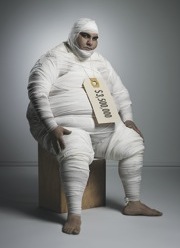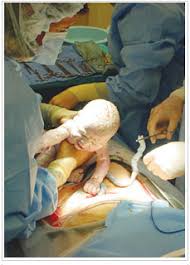January 31st, 2011 by Toni Brayer, M.D. in Health Policy, Opinion
1 Comment »

 Author-physician Dr. Atul Gawande has done it again with a well-written article in The New Yorker magazine entitled, “The Hot Spotters.” It deals with the fact that 5 percent of people with chronic illness make up over 50 percent of all healthcare costs.
Author-physician Dr. Atul Gawande has done it again with a well-written article in The New Yorker magazine entitled, “The Hot Spotters.” It deals with the fact that 5 percent of people with chronic illness make up over 50 percent of all healthcare costs.
If we can zero in on providing better preventive care for those people, we can finally get our arms around runaway healthcare costs. How great that you don’t even have to have a New Yorker subscription to read it. Here are a few cliff notes until you get to it:
— In Camden, New Jersey, one percent of patients account for one-third of the city’s medical costs. By just focusing attention on the social and medical outpatient needs of those people, they not only got healthier but costs were cut in half.
— Our current system is unable to reign in costs. We need to completely re-design and fund how we do primary care.
— Charging high co-payments to people with health problems just backfires. They avoid preventive care and end up hospitalized with expensive and life-threatening illnesses that are much worse and more costly. Read more »
*This blog post was originally published at EverythingHealth*
January 11th, 2011 by Linda Burke-Galloway, M.D. in Better Health Network, Health Tips
No Comments »

 Although I’ve been a proponent for the prevention of medical errors for years and wrote a book to address those issues, I think my obstetrician-gynecologist (OB/GYN) colleagues are finally catching on.
Although I’ve been a proponent for the prevention of medical errors for years and wrote a book to address those issues, I think my obstetrician-gynecologist (OB/GYN) colleagues are finally catching on.
Dr. Patrick Duff of the University of Florida’s OB/GYN department wrote an article in the December issue of the journal Obstetrics & Gynecology that caught my attention. In his article, “A Simple Checklist for Preventing Major Complications Associated with Cesarean Delivery,” Duff outlines steps that OB/GYNs should take in order to reduce complications during and after a cesarean section. Duff patterns his list after Dr. Atul Gawande’s book, “The Checklist Manifesto: How to Get it Right,” which has set the standard regarding reducing complications after surgery. According to Duff, the following steps should be taken in order to reduce complications after a cesarean section:
1. Clip hair at the surgical site just before making the incision to reduce wound infections. Duff states that there is a greater chance of promoting infections when the hair is shaved the night before the procedure. He also recommends clipping hair as opposed to shaving which reduces the rate of would infections.
2. Cleanse skin with chlorhexidine solution rather than iodine because medical studies have demonstrated a reduction in infections using chlorhexidine solution.
3. Give broad spectrum antibiotics before the surgical incision as opposed to after the newborn’s umbilical cord is clamped. Read more »
*This blog post was originally published at Dr. Linda Burke-Galloway*
November 24th, 2010 by Davis Liu, M.D. in Better Health Network, Health Policy, News, Opinion, True Stories
1 Comment »

 A recent medical error of a wrong-site surgery that occurred in one of the country’s best hospitals, Massachusetts General, reminded me why doctors need to be less like Chuck Yeager and more like Captain Sullenberger.
A recent medical error of a wrong-site surgery that occurred in one of the country’s best hospitals, Massachusetts General, reminded me why doctors need to be less like Chuck Yeager and more like Captain Sullenberger.
Growing up, I always wanted to be a fighter pilot, years before the movie “Top Gun” became a part of the American lexicon. My hero was World War II pilot Chuck Yeager, who later became one of the country’s premier test pilots flying experimental jet and rocket propelled planes in a time when they were dangerous, unpredictable, and unreliable.
Much like the astronauts in the movie “The Right Stuff,” Yeager and his colleagues literally flew by the seat of their pants, made it up as they went along, and never really knew if their maiden flight in a new aircraft might be their last. They were cowboys in the sky wrangling and taming the heavens.
Fast forward to January 2009, when shortly after takeoff, a one-in-a-million chance, a double-bird strike completely disabled a US Airways jetliner. Captain Chesley Sullenberger, with the help of his co-pilot Jeff Skiles, ditches the aircraft in the Hudson River in under four minutes even as the nation surely expected a tragedy. But not on that day. Not with that pilot. Read more »
*This blog post was originally published at Saving Money and Surviving the Healthcare Crisis*
 Author-physician Dr. Atul Gawande has done it again with a well-written article in The New Yorker magazine entitled, “The Hot Spotters.” It deals with the fact that 5 percent of people with chronic illness make up over 50 percent of all healthcare costs.
Author-physician Dr. Atul Gawande has done it again with a well-written article in The New Yorker magazine entitled, “The Hot Spotters.” It deals with the fact that 5 percent of people with chronic illness make up over 50 percent of all healthcare costs.




 A
A 







